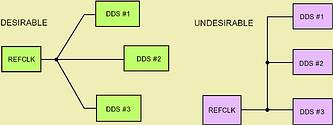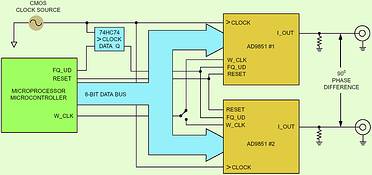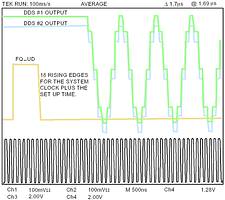Solution for synchronising multiple direct digital synthesizers
22 May 2002
DSP, Micros & Memory
The fast frequency hopping, extreme tuning resolution, and programmable phase control attributes of direct digital synthesizers (DDSs) make them a compelling choice for a wide variety of signal synthesis applications. However, many applications, such as phased-array radar and critical timing generators, require precise phase-synchronisation of multiple synthesized output signals. Phase synchronisation of multiple synthesizers is a challenge for PLL and other traditional analog-based architectures.
The AD9852/9854 and AD9850/9851 DDS devices from Analog Devices, with up to 14 bits of programmable phase-offset resolution (for AD9852/9854), provide an easy and precise solution for phase synchronisation of multiple synthesized signals. The synchronisation of multiple DDS devices is accomplished as follows.
There are two basic timing requirements to be met in order for successful synchronisation to occur. The first, and somewhat obvious, is a coincidental REF clock between all DDSs. Coincidental means that the REF clock pins of each DDS have REF clock timing coincident in time (Figure 1). This is accomplished through proper PCB layout.
Figure 1. PCB layout must ensure that REFCLK edge arrives coincidentally at clock input pins of multiple DDSs
The second timing requirement between all DDS devices is the coincidental transfer of the programmed input data to the DDS core. Performing this transfer are two key signals: FQ_UD for the AD9850/9851 and I/O update clock for the AD9854/9852. If the rising edges of these two signals are sent synchronously to the multiple DDSs, along with proper set-up time relative to the REF clock, then synchronisation will be achieved (Figure 2).
Figure 2. Dual AD9851 set-up for quadrature output
With proper procedure, synchronisation can be readily achieved among multiple DDSs; Figure 3 illustrates synchronisation of two AD9851 devices. In this case, the REFCLK frequency is set to 10 MSa/s. Synchronisation is also achievable up to the maximum system clock rate (including PLL mode).
Figure 3. DDS synchronisation (conditions: VCC = 5 V, REFCLK = 10 MSP, nonPLL mode, 25°C)
Typical applications are for clock synthesis, ADC encode generators, and agile local oscillators.
Further reading:
ESP32-C6 achieves PSA-L2
iCorp Technologies
DSP, Micros & Memory
Espressif Systems recently announced that its ESP32-C6 microcontroller has achieved PSA Certified Level 2 (PSA-L2) security certification, making it the first RISC-V-based MCU to reach this level.
Read more...
Microprocessor with integrated NPU
Avnet Silica
DSP, Micros & Memory
The RZ/G3E from Renesas is a microprocessor integrated with quad CPU and NPU in one chip, improving power efficiency, reliability, and security.
Read more...
Nordic Semiconductor launches nRF Connect SDK Bare Metal option for nRF54L series
Avnet Silica
DSP, Micros & Memory
This is a new, RTOS-independent software solution for Bluetooth LE development, designed to ease developers’ migration from the legacy nRF5 SDK and nRF52 series to the next-generation nRF54L series.
Read more...
Dual-core support in NECTO Studio
DSP, Micros & Memory
MIKROE recently announced that version 7.3.0 of its NECTO Studio Integrated Development Environment now supports dual-core MCUs, allowing designers to program and debug each core independently.
Read more...
Post Quantum Cryptographic firmware library
DSP, Micros & Memory
The STM32 post-quantum cryptographic library enables developers to satisfy application requirements for any combination of data integrity, confidentiality, identification/authentication, and nonrepudiation.
Read more...
MultiVolt series of oscillators
Future Electronics
DSP, Micros & Memory
The ECS-3225MVQ from ECS Inc. is a compact, quartz-based MultiVolt oscillator designed for precision timing in automotive, industrial, and portable electronic systems.
Read more...
MCU platform for battery-powered devices
Altron Arrow
DSP, Micros & Memory
The MCX W23 is a new dedicated wireless MCU platform from NXP for battery-powered sensing devices.
Read more...
Drive innovation with AURIX TriCore MCUs
Future Electronics
DSP, Micros & Memory
Infineon’s AURIX TriCore family balances safety, performance, and energy efficiency to offer a scalable and future-ready portfolio.
Read more...
Elevate your motor control designs
EBV Electrolink
DSP, Micros & Memory
Built on an Arm Cortex-M33 core running up to 180 MHz, the MCX A34 family combines high-performance math acceleration and advanced motor control subsystems to unlock efficient motor drive solutions.
Read more...
Embedded platform for compute-intensive applications
iCorp Technologies
DSP, Micros & Memory
The Quectel QSM368ZP-WF is a fully featured embedded ARM platform optimised for compute-intensive industrial and IoT applications.
Read more...




